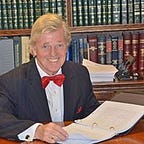Pardon Me — Trump
by John P.Flannery
Back in 1974, when the Justice Department was asked whether Nixon could pardon himself, the opinion was, “No.”
This is an excerpt of that memo.
Starting off with the section of the constitution dealing with pardons, DOJ had this to say those many years ago.
“Pursuant to Article II, Section 2 of the Constitution, the ‘Power to grant Reprieves and Pardons for Offenses against the United States, except in Cases of Impeachment,’ is vested in the President. This raises the question whether the President can pardon himself. Under the fundamental rule that no one may be a judge in his own case, it would seem that the question should be answered in the negative.”
That has pretty much been the consensus of those giving their opinion these days — that Trump cannot pardon himself.
The DOJ also considered back them if there was a saving grace in the so-called “necessity doctrine,” and they decided that didn’t apply either.
“The necessity doctrine would not appear applicable here. That doctrine deals with the situation in which the sole or all judges or officials who have jurisdiction to decide a case are disqualified because they belong to a class of persons who have some interest in the outcome of the litigation, thus depriving the citizen of a forum to have his case decided. In that situation the disqualification rule is frequently relaxed to avoid a denial of justice. Evans v. Gore, 253 U.S. 245, 247– 48 (1920);** Tumey v. Ohio, 273 U.S. 510, 522 (1927). It is, however, extremely questionable whether that doctrine is pertinent where the deciding official himself would be directly and exclusively affected by his official act. See Tumey, 273 U.S. at 523.”
Another inconvenience in Trump receiving a pardon is that you only receive a pardon to avoid the punitive consequences of a crime you committed.
Hannity only last evening said Trump should pardon his whole family and himself.
The power or authority to act is not without limits. The power may be abused. For a person to pardon his family and himself, that is precisely that kind of abuse that is prohibited.
For a person to be a judge in his own case, or his family’s case, is a denial of fundamental fairness, of due process, a constitutional guarantee.
In other words, the exercise of a constitutional power is necessarily abusive if it fails to recognize the constraint of what is due process.
It is an interesting question should Trump abuse his power in this fashion if he wouldn’t lose his fifth amendment right that protects him from being a witness against himself.
In other words, Mr. Trump could be summoned to testify under oath and be compelled to do so in the grand jury or before congress or judicial hearings.
There is also the nice question if Trump will concede by pardoning himself that he has committed crime — for why else is one pardoned, and why else would one pardon himself?
JPF
